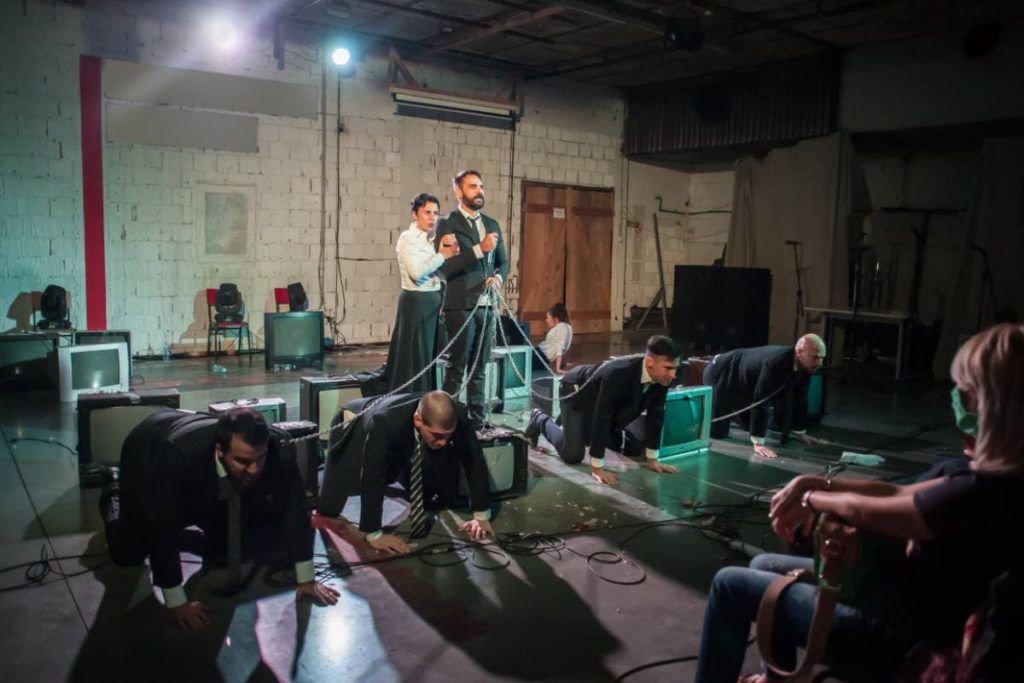Plays were arguably invented in the 5th Century in the Acropolis in Athens. Since then, they have been performed everywhere, from preschools to internationally renowned stages. We know how long plays have been around, but how long do they last?
A play usually lasts from ten minutes to three hours. Plays with shorter scripts, such as one-act plays, usually won’t last longer than an hour at the absolute maximum. Full-length plays can go on for an hour or two, depending on how much content is in the script.
Stick around to learn more about the main types of plays, how long they last, and what determines their runtimes.

Types of Plays and How Long They Last
There are a vast number of play types and movements within theatre. Based on their format and run time, we can separate theatre plays into a few main categories. These categories are one-act plays, full-length plays, musicals, ten-minute plays, and sketches.
- Ten-minute plays are complete stories with a beginning, middle, and end, condensed into ten minutes. Typically the script itself will not span more than ten pages.
- One-act plays are some of the shortest and typically run for around half an hour to an hour maximum. This can vary depending on how long the script is.
- Full-length plays, or “evening plays” as they are sometimes called, can take an hour or more. Ordinarily, they take around two to three hours, but longer than three hours isn’t ideal for keeping audiences engaged.
- Musicals, like full-length plays, can be quite lengthy and packed with details and dialogue. The standard runtime for a musical is two and a half hours.
- A sketch is similar to a ten-minute play, except it is not a complete story but rather a section of a story. These are popular at festivals or between other performances as a “palate cleanser” for the audience.
- Epic plays are immensely complex and lengthy and involve a huge cast and many props and subplots. There has been a revival of epic theatre, especially in Germany, but it’s still quite a rare occurrence.
Theatrecrafts.com details types of theatre, when they were developed, and what they were created for.
Typical Play Script Lengths
The length of a script determines the length of the play, which can change after editing, and can vary dramatically. Still, there is a general ballpark of how long each script type tends to be.
The script of a sketch or ten-minute play can be one page. However, they can also be multiple pages, but rarely longer than ten pages. One-act plays can be one page, six pages, or 20 pages, depending on the playwright’s story. Full-length plays and musicals can be twenty pages or one hundred pages. It all depends on the playwright’s story.
To learn about the elements and processes of writing an excellent play script, take a look at this playwriting Masterclass by Pulitzer Prize-winner David Mamet.
Maximum Script Length
The max page limit for a play script is considered to be about 100 pages. Consider the relationship between script size and runtime. We can calculate that actors spend one minute on every page of the script, and thus 100 pages come out as 100 minutes of run time.

One-act plays should be about half of this, and ten-minute plays should have about 10 pages in a script, with a maximum of 15.
These are general guidelines based on audience engagement and how long a performance can grip an audience. But any of these can go below or above these guidelines based on the story and personal preference.
Playwrights may find it difficult to be ruthless with script editing. Nobody wants to cut out a character they worked hard on or dialogue they took hours to write. However, if anything in the script doesn’t contribute to the flow and natural progression of the performance, it must go.
Scribendi offers script editing services for playwrights who need a little extra help letting go of their first draft.
Optimal Runtime for a Play
Ninety minutes is considered the standard and even ideal runtime for theatre production, especially if there’s no intermission in the middle. However, if a show is extremely well-written and engaging, audiences don’t seem to mind sitting for a while longer.
Critics consider 90 minutes the ideal, too, as watching plays regularly makes you hyper-aware of time passing, especially if the show is bland and they’ve seen the same story repeatedly. But 90 minutes of quality performance and writing is well worth it.
However, critics also say that a brilliant story with a shorter runtime is a kind of ideal, especially today where people have shorter attention spans: or do they?
Psychologists have busted the myth that our attention spans are rapidly decreasing, which shows when it comes to theatre. Audiences are more than willing to watch a three-hour performance if it’s a story they love or an excellently-executed story with convincing actors and intelligent dialogue.
The main point is that runtime isn’t the issue. Instead, the issue is how well the script is written, how well-rounded the characters are, how clever and realistic the dialogue is, and how well the story flows as a whole.
This, of course, depends on more than just the playwright’s work on the script, stage direction, the skill of the actors, and the kinds of people that happen to be in the audience that night.
Playwrights who are just starting out, or playwrights with some experience who need a refresher, should read this basic rundown on how to put on a successful play. The guide shows you everything from choosing a show or script and assembling your team to selecting a venue and rehearsing your script.
Conclusion
A play can last ten minutes, one hour, three hours, or anything in between. The runtime of a play depends on the script and the type of play being performed.
However, the play’s runtime is secondary to the quality of the content and performance that is being produced. A two-hour play with the audience holding their breath will attract more people than a vacuous 20-minute sketch.

